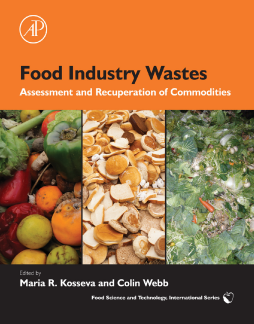
Additional Information
Book Details
Abstract
Food Industry Wastes: Assessment and Recuperation of Commodities presents emerging techniques and opportunities for the treatment of food wastes, the reduction of water footprint, and creating sustainable food systems. Written by a team of experts from around the world, this book provides a guide for implementing bioprocessing techniques. It also helps researchers develop new options for the recuperation of these wastes for community benefit.
More than 34 million tons of food waste was generated in the United States in 2009, at a cost of approximately $43 billion. And while less than three percent of that waste was recovered and recycled, there is growing interest and development in recovering and recycling food waste. These processes have the potential not only to reduce greenhouse gases, but to provide energy and resources for other purposes.
This book examines these topics in detail, starting with sources, characterization and composition of food wastes, and development of green production strategies. The book then turns to treatment techniques such as solid-state fermentation and anaerobic digestion of solid food waste for biogas and fertilizer. A deep section on innovative biocatalysts and bioreactors follows, encompassing hydrogen generation and thermophilic aerobic bioprocessing technologies. Rounding out the volume are extensive sections on water footprints, including electricity generation from microbial fuel cells (MFCs), and life cycle assessments.
- Food waste is an area of focus for a wide range of related industries from food science to energy and engineering
- Outlines the development of green product strategies
- International authoring team represents the leading edge in research and development
- Highlights leading trends of current research as well as future opportunities for reusing food waste
"The text is a concise presentation of the important aspects related to food waste and has the main purpose to emphasize the trends which cover techniques discard management food and their technologies process."--Industrie Alimentari (Food Industry), September 2013 (in Italian) "…chemical and environmental engineers examine problems and opportunities in food industry wastes, the treatment of solid food wastes, improved biocatalysts and innovative bioreactors for the enhanced bioprocessing of liquid food wastes, assessing water and carbon footprints and the rehabilitation of food industry waste water, and assessing the environmental impact of food production and consumption."--Reference and Research Book News, August 2013
